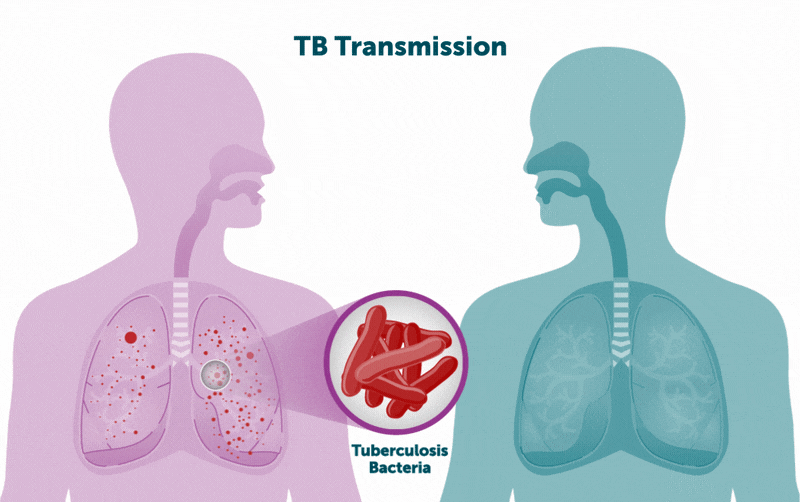Key points
- Tuberculosis (TB) germs spread through the air from one person to another.
- TB germs can get into the air when someone with active TB disease coughs, speaks, or sings.
- People nearby may breathe in these germs and become infected.
- People with inactive TB, also called latent TB infection, cannot spread TB germs to others.

Causes
Tuberculosis (TB) is caused by a bacterium (or germ) called Mycobacterium tuberculosis. When a person breathes in TB germs, the germs can settle in the lungs and begin to grow. From there, they can move through the blood to other parts of the body, such as the kidney, spine, and brain.
TB bacteria can live in the body without making you sick. This is called inactive TB, or latent TB infection. People with inactive TB are infected with TB germs, but they do not have active TB disease. They do not feel sick, do not have symptoms of TB disease, and cannot spread TB germs to others.
Without treatment, people with inactive TB can develop active TB disease at any time and become sick.
TB germs become active if the immune system can't stop them from multiplying and growing in the body. When TB germs are active (multiplying in your body), this is called active TB disease. People with active TB disease feel sick. They may also be able to spread the germs to people they spend time with every day. Without treatment, active TB disease can be fatal.

How it spreads
TB germs can get into the air when a person with active TB disease of the lungs or throat coughs, speaks, or sings. These germs can stay in the air for several hours, depending on the environment.
TB germs are more likely to spread in indoor areas or other places with poor air circulation (such as a closed vehicle) than in outdoor areas. People nearby may breathe in these germs and become infected.
TB germs are not spread by:
- Shaking someone's hand
- Sharing food or drink
- Touching bed linens or toilet seats
- Sharing toothbrushes
- Kissing
Prevention methods
If you have inactive TB, treating it is the best way to prevent active TB disease.
Without treatment, people with inactive TB can develop active TB disease.
People with weakened immune systems are at very high risk of developing active TB disease once infected with TB germs. It is very important that these people receive treatment for inactive TB to prevent the development of active TB disease.
If you have active TB disease of the lungs or throat, you may need to take steps to prevent spreading TB germs to other people.
If you have TB disease of the lungs or throat, you could be infectious. This means you could spread TB germs to others.
Your health care provider will tell you what steps you can take to keep from spreading TB germs to others. This may include things like covering your mouth with a tissue when you cough or staying home from work or school. After taking your medicine for a few weeks, you will feel better and you may no longer be infectious to others.
When transmission is possible
Active TB disease in the lungs or throat can be infectious. This means the germs can spread to other people. TB disease in other parts of the body, such as the kidney or spine, is usually not infectious.
People with active TB disease are most likely to spread it to people they spend time with every day. This includes family members, friends, and coworkers or schoolmates.
Do you think you may have been exposed to TB?
Risk factors
You may have been exposed to TB germs if you spent time near someone with active TB disease.
You have a higher risk of being exposed to TB germs if you:
- Were born in or frequently travel to countries where TB is common, including some countries in Asia, Africa, and Latin America
- Live or used to live in large group settings where TB is more common, such as homeless shelters, prisons, or jails
- Recently spent time with someone who has active TB disease
- Work in places where TB is more likely to spread
You have a higher risk of developing active TB disease once infected if you:
- Were recently infected with TB germs
- Have a weaker immune system because of certain medications or health conditions such as diabetes, cancer, or HIV
Some people develop active TB disease soon (within weeks) after becoming infected, before their immune system can fight the TB germs. Other people may get sick years later, when their immune system becomes weak for another reason.
